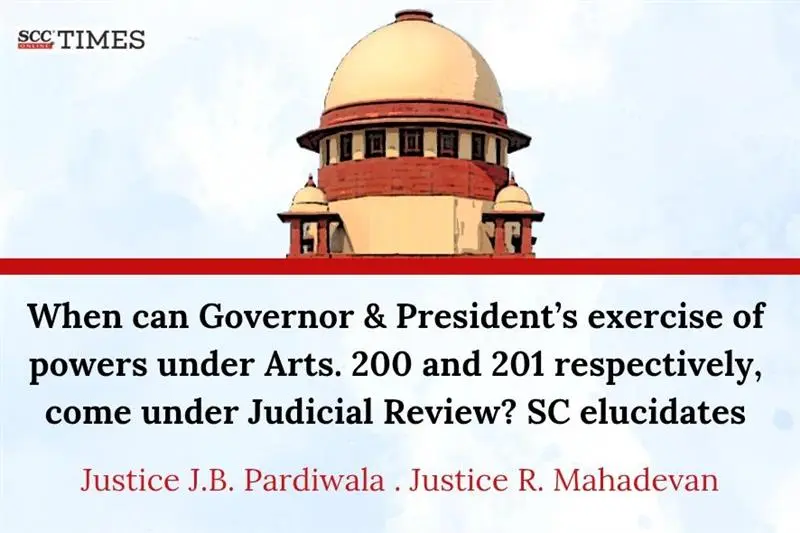Supreme Court: While considering the instant petition under Article 32 of the Constitution filed by State of Tamil Nadu aggrieved with the their Governor withholding of assent to and reserving for consideration of the President of 10 Bills enacted by the Legislature for the State of Tamil Nadu; Governor’s inaction to give sanction for prosecution against tainted public servants and pendency of several important files concerning premature release of prisoners and appointment of public servants; the Division Bench of J.B. Pardiwala* and R. Mahadevan JJ., that reservation by the Governor of the 10 Bills for the consideration of the President in the second round was illegal, erroneous in law and is thus liable to be set aside. The Court further held that the Bills, having been pending with the Governor for an unduly long period of time, and the Governor having acted with clear lack of bona fides in reserving the Bills for the consideration of the President, are deemed to have been assented to by the Governor on the date when they were presented to him after being reconsidered.
“The Constitution is our bedrock ensuring our safety and security. It outlines a process that keeps us rooted in values. We read it for reference and for every policy decision. Without it, we would be lost and make many mistakes. It is now seventy-five years old, but we still keep turning to it, why? Because it guarantees our rights and sets benchmarks for our responsibilities. The laws and rules that uplift all people sprout from its pristine womb, welfare of all is its primary concern, but its sanctity and safety should be our prime concern”.
Background:
The Legislature for the State of Tamil Nadu, between 13-01-2020 and 28-04-2023, enacted and forwarded 12 Bills to the Governor for grant of assent as per Article 200 of the Constitution. Even though the current Governor took charge of the office with effect from 18-11-2021, yet he did not take the necessary action on any of the said Bills forwarded to his office till October 2023. The petitioner, being aggrieved by the inaction on part of the Governor, had to ultimately file the instant writ petition. The Court issued notice to the respondents on 10-11-2023 and the Governor took a decision on the 12 Bills on 13-11-2023 by withholding assent simpliciter to 10 bills. On 28-11-2023, the Governor, without the aid and advice of the Council of Ministers of the State, in exercise of his discretion, reserved the said repassed Bills for the consideration of the President. Although the Governor noted that the Bills were intra-vires the competence of the State Legislature having been legislated under Entry 66 of List I, Entry 32 of List II and Entry 25 of List III, yet he reserved the said Bills for the consideration of the President in the second round on the ground that the Bills suffered from repugnancy on account of being contrary to Entry 66 of the Union List i.e., List I.
Supreme Court on Judicial review of the exercise of power under Article 200 and Article 201:
The Court explained that Judicial Review and Justiciability are not synonymous concepts. The power of judicial review in a written constitution is implicit. Unless expressly excluded by a provision of the Constitution, the power of judicial review is available in respect of exercise of powers under any of the provisions of the Constitution. On the other hand, justiciability relates to a particular field falling within the purview of the power of judicial review. Hence, while grant of assent by the Governor or the President, being acts which are generally taken upon the aid and advice of the Council of Ministers, may not be justiciable, the withholding of assent or reservation of bills for the consideration of the President by the Governor in exercise of his discretion which is subject to the limits defined by the Constitution, would be justiciable on the touchstone of judicially determinable standards.
The Court thus laid down the following findings vis-à-vis Judicial Review of Governor’s power under Article 200 of the Constitution and President’s power under Article 201 of the Constitution:
Where the Governor reserves a bill for the consideration of the President in his own discretion and contrary to the aid and advice tendered to him by the State Council of Ministers, it shall be open to the State Government to assail such an action before the appropriate High Court or Supreme Court on the following grounds:
-
Where the reservation is on the ground that the bill is of a description falling under the Second Proviso to Article 200 of the Constitution, it may be assailed on the ground that the bill or any provision thereof does not so derogate from the powers of the High Court so as to endanger the position which that court is designed by the Constitution to fill. The Governor while reserving a bill on this count shall be expected to provide clear reasons and also point to the specific provision(s) of the bill which, in his opinion, attract the Second Proviso. This question being purely of a legal nature would be completely justiciable and the competent court would be, after a proper adjudication, fully authorized to approve or disapprove of such reservation by the Governor. If such a challenge finds favour with the competent court, then, subject to any other considerations, it would be a fit case for the issuance of a writ in the nature of Mandamus to the Governor for appropriate action. If, however, the challenge should fail then the mechanism envisaged under Article 201 of the Constitution will spring into action.
-
Where the reservation is on account of the bill attracting any provision of the Constitution wherein the assent of the President is a condition precedent for the proper enactment and enforceability of such a bill as a law (Article 364-A2) or for the purpose of securing any immunity (Article 31-A) or overcoming any repugnancy that may exist qua a Central Legislation (Article 254(2)), then the Governor is expected to make a specific and clear reference to the President properly indicating the reasons for such reservation and inviting his attention Such a reservation can be challenged by the State Government, if the reference made by the Governor either fails to indicate the reasons for such reservation or that the reasons indicated are wholly irrelevant, mala-fide, arbitrary, unnecessary or motivated by extraneous considerations. Then such a reservation would be liable to be set aside. This question being purely of a legal nature would be completely justiciable and the competent court would be fully authorized to approve or disapprove of such reservation by the Governor after a proper adjudication.
-
Where the reservation of a bill by the Governor for the consideration of the President is on the grounds of peril to democracy or democratic principles or on other exceptional grounds, then the Governor would be expected to make a specific and clear reference to the President properly indicating the reasons for entertaining such a belief by pin-pointing the specific provisions in this regard and the consequent effect that may ensue if such a bill were to be allowed to become a law. The Governor while making such a reference should also indicate his subjective satisfaction as to why the aforesaid consequences that may ensue cannot be possibly curtailed or contained by taking recourse to the constitutional courts of the country. It shall be open to the State Government to challenge such a reservation on the ground of failure on part of the Governor to furnish the necessary reasons or that the reasons indicated are wholly irrelevant, mala-fide, arbitrary, unnecessary or motivated by extraneous considerations. This being a question completely capable of being determined by the constitutional courts, would be fully justiciable.
-
Reservation of a bill on grounds such as personal dissatisfaction of the Governor, political expediency or any other extraneous or irrelevant considerations is strictly impermissible by the Constitution and would be liable to be set-aside forthwith on that ground alone. This will also encompass reservation of a bill by the Governor after having already exercised the option of withholding of assent in terms of Article 200 except in exceptional circumstances.
-
Where the Governor exhibits inaction in making a decision when a bill is presented to him for assent under Article 200 and such inaction exceeds the time-limit as prescribed the Court, then it shall be open to the State Government to seek a writ of Mandamus from a competent court against the Governor directing expeditious decision on the concerned bill as is the mandate of the Constitution. However, the Court clarified that the Governor may successfully resist such a challenge on providing sufficient explanation for the delay caused.
Where the Governor reserves a bill for the consideration of the President and the President in turn withholds assent thereto then, it shall be open to the State Government to assail such an action before this Court. Such a challenge can broadly be made on the following grounds:
-
Where a State bill has been reserved by the Governor for the consideration of the President on the ground that assent of the President is required for the purpose of making the bill enforceable or securing some immunity, then in such cases the withholding of assent by the President would be justiciable to the limited extent of exercise of such power in an arbitrary or malafide manner. Owing to the political nature of the assent of the President in these categories of bills, the courts would impose a self-restraint.
-
Where a State bill has been reserved by the Governor, in his discretion, for the consideration of the President on the ground that the bill appears to be patently unconstitutional for placing the principles of representative democracy in peril, the withholding of assent by the President would, in ordinary circumstances, involve purely legal and constitutional questions and therefore be justiciable without any impediments imposed by the doctrine of political thicket. In such cases, it would be prudent for the President to obtain the advisory opinion of the Supreme Court by way of a reference under Article 143.
-
Where the President exhibits inaction in making a decision when a bill is presented to him for assent under Article 201 and such inaction exceeds the time-limit as has been prescribed by the Court, then it shall be open to the State Government to seek a writ of Mandamus from the Supreme Court.
In its concluding remarks, the Court invoked Dr B.R Ambedkar who said that, “However good a Constitution may be, it is sure to turn out bad because those who are called to work it, happen to be a bad lot. However bad a Constitution may be, it may turn out to be good if those who are called to work it, happen to be a good lot”. The Court emphasised that it is Supreme Court’s duty as the highest constitutional court to recognize such evil and increasingly strengthen the initiative to remove them.
“It is only when the constitutional functionaries exercise their powers by and under the Constitution that they show deference to the people of India who have given the Constitution to themselves”.
The Court thus expressed hope and trust that the Governor and the Tamil Nadu Government would work in tandem and harmoniously keeping the interests and well-being of the people as their paramount consideration.
CASE DETAILS
|
Citation: Appellants : Respondents : |
Advocates who appeared in this case For Petitioner(s): For Respondent(s): |
CORAM :









Please review and provide final judgements on all the pending cases within 3 months atleast, first then advice, the President of India